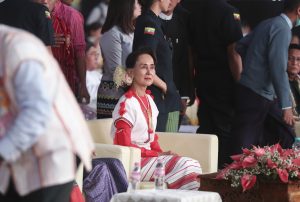 Outgoing UN human rights envoy for Myanmar Yanghee Lee says she believes State Counselor Aung San Suu Kyi can change after failing to live up to her reputation as a humanitarian. But that seems unlikely to happen as fighting continues in the troubled northern state of Rakhine.
Outgoing UN human rights envoy for Myanmar Yanghee Lee says she believes State Counselor Aung San Suu Kyi can change after failing to live up to her reputation as a humanitarian. But that seems unlikely to happen as fighting continues in the troubled northern state of Rakhine.
Sources close to the fighting said explosions had been heard near Rathedaung, where the Myanmar military (known as Tatmadaw) was going door-to-door in three villages searching for members of the Arakan Army, which it describes as a “terrorist group.”
The report can not be verified independently but sources named the villages as Zayti Pyin, Thar Yar Kone, and Maw Htet, adding that two people had been killed in recent days, while arrests were also made with the fighting spilling over into the nearby state of Chin.
“Tatmadaw are looking at household lists and photographing everyone in the village,” one source said amid speculation in the area that Germany will soon withdraw development aid for Myanmar and redirect it to Africa.
According to the UN, at least 32 people were killed by the fighting between mid-March and mid-April. The military insists it is not targeting civilians.
That’s cold comfort for Lee, whose job encompassed the alleged genocide and exodus of 750,000 people, mostly Muslim Rohingyas who fled across the border and into Bangladesh. She was blunt in her assessment of Suu Kyi, a Nobel laureate who took office in 2015 after a historic election.
“We all knew that she was put on a pedestal or portrayed as the icon of democracy and human rights, but ever since [her party] has taken office and ever since she took the office of the state counselor, all of her actions and her words, statements point otherwise,” she said.
“I would still like to believe that she can change how she’s been doing, but perhaps the world didn’t really know who she was,” she told the Al Jazeera television network, adding Suu Kyi’s response was “utterly disappointing.”
Lee has repeatedly been denied entry to Myanmar, where generals slated for a possible genocide trial continue to do as they please.
Those generals include Commander-in-Chief Min Aung Hlaing, Deputy Commander-in-Chief Soe Win, Brigadier General Than Oo, and Brigadier General Aung Aung who are among the “most wanted” by UN-backed investigators for the 2017 ethnic cleansing of more than 700,000 Rohingya Muslims.
However, whether the latest fighting contravenes orders and findings handed down in a preliminary order by the International Court of Justice (ICJ) in The Hague in January is difficult to gauge.
In a preliminary ruling on a case was filed by The Gambia, the ICJ dismissed a defense by Suu Kyi that the Rohingyas were simply caught in the crossfire and imposed emergency “provisional measures” on her country in respect to the requirements of the 1948 genocide convention.
The court declared there was prima facie evidence of breaches of the convention and warned that about 600,000 Rohingyas still in Myanmar were extremely vulnerable to attacks by the military.
The binding ICJ orders “require the government to prevent genocidal acts, ensure military and police forces do not commit genocide, and to preserve evidence of genocidal acts.” Myanmar must report back on its compliance within four months.
Myanmar’s response will be assessed by the UN Security Council, where Suu Kyi enjoys diplomatic support from China, one of the five permanent members with the power of veto. Lee’s final assessment will no doubt make for an interesting read.
She added: “I can’t come out with a conclusion before the court (ICJ) that is mandated to deal with genocide … but I say it bears the hallmarks of genocide.”
Luke Hunt can be followed on Twitter @lukeanthonyhunt
No comments:
Post a Comment